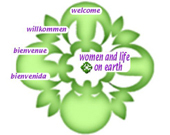|
some definitions
from Mary Mellor and Maria Mies and Vandana Shiva
Mary Mellor (UK): "Ecofeminism
is a movement that sees a connection between the exploitation and degradation
of the natural world and the subordination and oppression of women.
It emerged in the mid-1970s alongside second-wave feminism and the green
movement. Ecofeminism brings together elements of the feminist and green
movements, while at the same time offering a challenge to both. It takes
from the green movement a concern about the impact of human activities
on the non-human world and from feminism the view of humanity as gendered
in ways that subordinate, exploit and oppress women."
--- From the
introduction to "Feminism & Ecology" by Mary Mellor, New
York Univerity Press,1997, p.1
 Ecofeminism:
An Overview Ecofeminism:
An Overview
Lois Ann Lorentzen, University of San Francisco, and Heather Eaton,
Saint Paul University (2002)
"Ecofeminism is an activist and academic movement that sees critical
connections between the domination of nature and the exploitation of
women....
Ecofeminist activism grew during the 1980s and 1990s among women from
the anti-nuclear, environmental, and lesbian-feminist movements. The
“Women and Life on Earth: Ecofeminism in the Eighties” conference held
at Amherst (1980) was the first in a series of ecofeminist conferences,
inspiring the growth of ecofeminist organizations and actions..."
 "Uprooting the Patriarchy"
"Ecofeminists
say 'no more waiting'... We are in a state of emergency and must do
something about it now... around the world, economies, cultures and
natural resources are plundered, so that 20 percent of the world's population
(privileged North Americans and Europeans) can continue to consume 80
percent of its resources in the name of progress."
"Uprooting the Patriarchy"
"Ecofeminists
say 'no more waiting'... We are in a state of emergency and must do
something about it now... around the world, economies, cultures and
natural resources are plundered, so that 20 percent of the world's population
(privileged North Americans and Europeans) can continue to consume 80
percent of its resources in the name of progress."
-- Lynn Wenzel
quoted in "Uprooting The Patriarchy" by Joy Pincus, WIN Magazine
back
to top
Maria Mies (Germany), Vandana Shiva (India):
"Th(e) capitalist-patriarchal
perspective interprets difference as hierarchical and uniformity as
a prerequisite for equality. Our aim is to go beyond this narrow perspective
and to express our diversity and, in different ways, address the inherent
inequalities in world structures which permit the North to dominate
the South, men to dominate women, and the frenetic plunder of ever more
resources for ever more unequally distributed economic gain to dominate
nature…
…everywhere,
women were the first to protest against environmental destruction. As
activists in the ecology movements, it became clear to us that science
and technology were not gender neutral; and in common with many other
women, we began to see that the relationship of exploitative dominance
between man and nature, (shaped by reductionist modern science since
the 16th century) and the exploitative and oppressive relationship between
men and women and prevails in most patriarchal societies, even modern
industrial ones, were closely connected…
If the final outsome
of the present world system is a general threat to life on planet earth,
then it is crucial to resuscitate and nurture the impulse and determination
to survive, inherent in all living things…
Ecofeminism
Ecofeminism,
a 'new term for an ancient wisdom' grew out of various social movements
- the feminist, peace and ecology movements - in the late 1970s and
early 1980s. Though the term was first used by Francoise D'Eaubonne
it became popular only in the context of numerous protests and activities
against environmental destruction, sparked-off initially by recurring
ecological disasters. The meltdown at Three Mile Island prompted large
numbers of women in the USA to come together in the first ecofeminist
conference - 'Women and Life on Earth: A Conference on Eco-Feminism
in the Eighties' - in March 1980, at Amherst. At this conference the
connections between feminism and militarization, healing and ecology
were explored. As Ynestra King, one of the Conference organizers, wrote:
'Ecofeminism is
about connectedness and wholeness of theory and practice. It asserts
the special strength and integrity of every living thing. For us the
snail darter is to be considered side by side with a community's need
for water, the porpoise side by side with appetite for tuna, and the
creatures it may fall on with Skylab. We are a woman-identified movement
and we believe we have a special work to do in these imperilled times.
We see the devastation of the earth and her beings by the corporate
warriors, and the threat of nuclear annihilation by the military warriors,
as feminist concerns. It is the masculinist mentality which would
deny us our right to our own bodies and our own sexuality, and which
depends on multiple systems of dominance and state power to have its
way.'
Wherever women acted
against ecological destruction or/and the threat of atomic annihilation,
they immediately became aware of the connection between patriarchal violence
against women, other people and nature, and that: In defying this patriarchy
we are loyal to future generations and to life and this planet itself.
We have a deep and particular understanding of this both through our natures
and our experience as women."...
-- From the introduction
to Ecofeminism
by Maria Mies and Vandana Shiva, 1993
For more resources
on ecofeminism:
www.ecofeminism.net
www.ecofeminism.org
aim to
provide audio, visual and textual resources combined with the best online
resources in ecofeminist philosophy and its related fields.
back
to top
home
|
